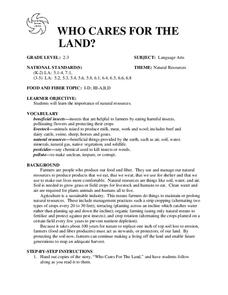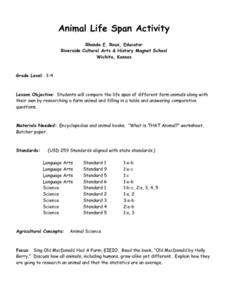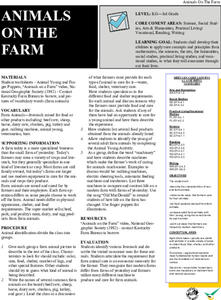Curated OER
WHO CARES FOR THE LAND?
Learners explore the importance of natural resources. They are given copies of the story, "Who Cares For The Land," and students follow
along as the teacher reads it. Learners identify the key points in the story. (Soil, water and air...
Curated OER
They Don't Just Eat Grass
Young scholars consider the USDA daily recommendations to create a "feed" product for middle schoolers. In this Health instructional activity, students learn about the ingredients in feed that is fed to livestock and apply the method to...
Curated OER
What's Your Brand?
Students explore the history of branding livestock and discover it began as early as 2000 BC. They discuss reasons for branding and then design their own brand from pipe cleaners. Students dip their brand into paint and print it on...
Curated OER
They Don't Just Eat Grass
Students explore and examine different types of feed used for livestock. They discuss types of feed, the need for energy and health, and create graphs of food compared to categories. Students organize data and complete worksheets on...
Curated OER
Animal Life Span Activity
Students study and compare the life span of farm animals with their own. They research a farm animal, complete a table and answer comparative questions. They work in jigsaw format groups.
Global Oneness Project
Exploring Cultural Sustainability
Small groups learn about a present-day nomadic culture in Mongolia and the threats to its existence by exploring a photo essay. The resource includes thoughtful discussion and writing prompts about cultural sustainability, the...
Curated OER
Animals on the Farm
Students work in groups to create a description of a farm animal. Other classmates try to guess the animal. The class discusses what farmers need to provide for each animal on their farm (food, shelter, veterinary care). Students...
Curated OER
Wild Dog Debate
Students participate in a mock conference addressing the possible extinction of African wild dogs. In this wild dogs lesson plan, students state their arguments and ask questions about the issues they have researched.
Curated OER
An Orderly Wagon Train Migration
Sixth graders work in small groups to organize a wagon train for a trek westward. They determine leadership responsibilities and rules needed to make a successful trek.
Curated OER
Lives of Native Americans and Settlers
Students assess the effect of contact between the Native Americans and Europeans after 1492. They explore the lives of the early European colonists and the Native Americans living along the East Coast of North America. Lesson contains...
Curated OER
The Lesson of the Kaibab
Learners plot the Kaibab deer population from 1905 to 1939 and analyze the changes over time. In this populations lesson plan, students investigate the causes of changing populations of the Kaibab deer and they find the carrying capacity...
Curated OER
Making a Brand for Ourselves the "Cowboy" Way
Students define cowboys and learn about their roles on rangelands. In this rangeland lesson, students define cowboys and cowgirls and complete a KWL chart. Students read Cattle Kids and Til the Cows Come Home. Students visit the...
Curated OER
Kids for Conservation: Water Conservation Winter
Students rotate through various hands on and critical thinking activites designed to show the amount of water actually used by various people, companies, etc..., and helpful ways of conseving water.
Curated OER
Kansas vs the U.S.
Students demonstrate an understanding of the physical and political geography of Kansas. They view maps and films to gain knowledge of Kansas. They calculate the percentage Kansas harvests for each crop out of the national total.













